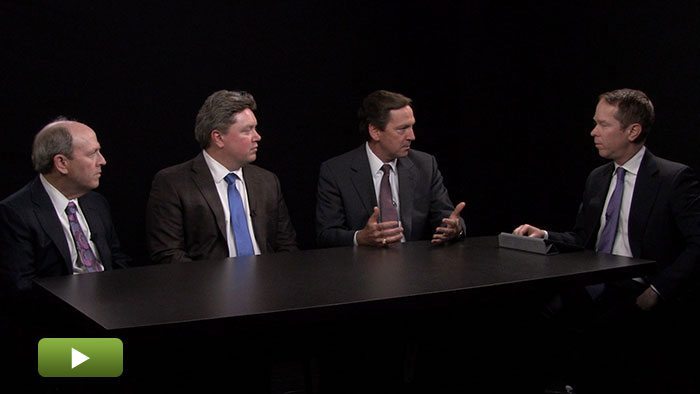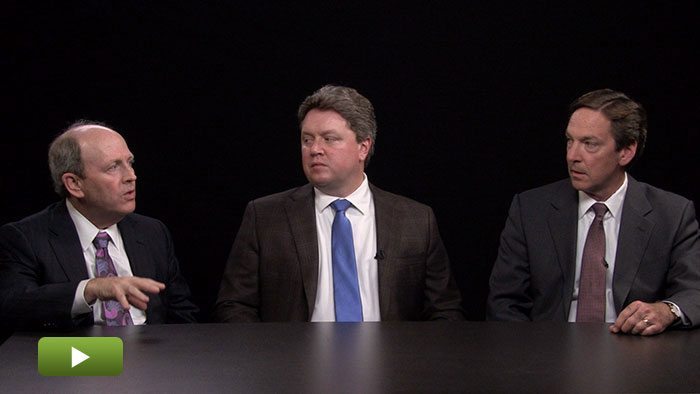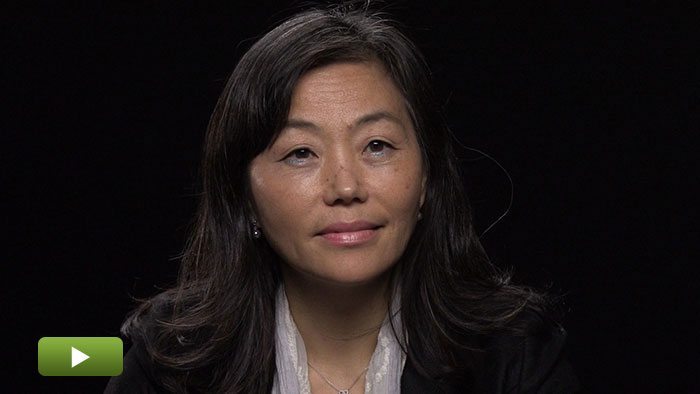NGP’s Blockbuster 11th Fundraise
NGP Energy Capital Management recently closed a $5.3-billion, energy-focused fund—its 11th—with excellent timing amid dropping oil prices. Three executives from the firm tell Privcap about why LPs didn’t drop out of the fund, and why NGP’s 26-year track record lends itself to weathering the storm of energy-market volatility.
The opinions expressed in this video are not, and should not be regarded as investment advice or as a recommendation regarding any particular security or course of action. Opinions expressed are current opinions as of the date appearing in this material only and are subject to change without notice.
Transcript Download Transcript
NGP’s Blockbuster Eleventh Fundraise
Inside the Energy PE Firm’s $5.3B Close
David Snow, Privcap: Today, we’re joined by Craig Glick, Christopher Ray and Tony Weber of NGP Energy Capital Management. Gentlemen, welcome to Privcap today. Thanks for being here.
Your firm is an energy specialist. You’ve been around for quite a while and you’ve just raised a new fund. It’s a Fund Eleven. Not a lot of firms have a Fund Eleven. Yours does.
You raised $5.3 billion to invest in energy. I’d love to hear the story of the fundraising. It sounds like it was very successful and, of course, $5.3 billion in today’s market is nothing to sneeze at. Starting with Tony, what was unique about this fundraising versus other cycles or other fundraisers?
Tony Weber, NGP Energy Capital Management: We were fortunate to start and finish that fundraising cycle within a calendar year. We started in January of 2014 and completed it several weeks ago, here in the early part of ’15. We benefit from being 26 years old these days—so many repeat investors. I think that makes it easier.
I’d say the other thing that’s helped us is [that] we distributed a lot of money over the last several years—in the last 24 months—in excess of $5 billion that we’ve distributed back to our LPs. It makes it a little easier when you’ve not only returned that capital, but done it at a very nice rate of return, to have those conversations and get them to come back in a new fund.
Snow: What kinds of questions were you getting from LPs this time out that may be different from previous fundraising?
Christopher Ray, NGP Energy Capital Management: I think they asked the really good questions that they always ask, but this time around, they were very focused on things like compliance and what kind of internal controls we have and assurance of our results and our valuations and to make sure that not only the front office, but also the back office is intact and working in sync the way it should.
Snow: And, of course, there’s a whole range of regulatory requirements on the energy company level that your firm needs to keep track of, right? Were they interested in how you monitor that as well?
Ray: They are. They’re interested in how we act as a board member, a portfolio company, and watching out for the capital at the company level as well as how we think about the portfolio collectively. We look at it from the fund and also the way we conduct ourselves as private equity fund professionals.
Craig Glick, NGP Energy Capital Management: And a lot of the questions related to at the portfolio company level—health, safety and environment—there were a lot more questions this time around…versus three or four years ago on fracking and fracking policies and how we make sure our companies are good stewards of the environment.
Weber: I think the good news is [that], as a firm that’s been around as long as we have and focused on one industry like we are, we’ve been accustomed to this.
The selfish part of that is, if you do those things, if you do manage those assets well, you’ll get paid more for them when you sell them. So it’s easy enough to answer that way to an LP and entice them to invest in your fund, but from a practical standpoint, we make a lot more money when we handle those assets well.
Ray: For us, too, with the LP’s focusing as they should on those issues, there is a natural flight to quality of sorts along every really facet. That’s just another one where some of it is established and has been doing it as a single industry focus that already had all those things in place anyway with the answers at the ready for something that is a practice for us that really helps the fundraising process because we’re not figuring it out as we go. We’ve already been doing it.
Snow: Your firm is 26 years old. Over those 26 years, how has the understanding of energy changed among investors? Where does energy fall within their portfolio and what benefits do they think a fund such as yours brings to their overall portfolio?
Weber: For us, about half of our current capital, but a much larger percentage of our original capital in earlier funds, came from the foundation and endowment world or high net–worth family–office community. They were early adaptors, frankly, 25 years ago, both in private equity and particularly in energy companies—your real asset businesses like ours.
Over time, the state pension plans, teacher pension plans and other folks we’ve partnered with in these investments have come along and understood that asset class much better; [they’ve] grown accustomed to the risks and the way we mitigate those risks to get the good rates of return. But it’s evolved and it has benefited our firm that those people have been consistently there and understand those risks so that when we come back, we can talk about things that are timely or topical and not the fundamentals of our industry.
So, when oil prices or gas prices drop like they have recently, we can have a real meaningful talk about what that means.
Glick: And, over time, we’ve been able to educate a lot of our limited partners. We did a lot of it this time because we did have a fair number of new partners join that the investments they make with us aren’t necessarily dependent on the price of the commodity. We don’t invest our dollars or our partners’ dollars, and we invest heavily ourselves, by the way, in all of our funds, hoping that prices are going to rise or hoping that they don’t fall.
We’re investing in businesses that make money by creating barrels, by creating more volumes. And we mitigate the impact of commodity prices by using very little leverage and by hedging a lot.
Snow: Does your firm offer co-investment for its LPs?
Weber: We do. It’s important for us to be a real partner with our investor partners. That means if we see an opportunity where we need additional capital inside one of these portfolio companies and it either exceeds the statutory amount we’re willing to put in an individual company or one where we’re just interested in bringing additional capital because of a sizeable investment, for instance, then the first order for us is to bring that to our existing partners.
We do that because it’s the right thing to do and we don’t charge for that. And I think they really appreciate it.
Snow: You mentioned the drop in oil prices that was happening right around the time you were wrapping up the fund. Did you get some nervousness or skittishness from some LPs? Was there some last-minute comfort–giving taking place?
Weber: We did get that comment or that question a lot, but I’d go back to something Craig said. We don’t worry about commodity prices like a lot of people would expect us to. Again, we hedge as much of that risk away as we can through our portfolio companies, hedging their production and their drilling plans going forward.
We have a good story as to how we mitigate that risk, but it does require that conversation because it’s topical. People look at the paper every day and see prices dropping for crude oil.
Snow: So, no LPs backed out in the end?
Weber: No LPs backed out.
Glick: And we have 26 years now—we’ve done the work to show that there is no correlation with regard to oil prices or gas prices and our returns. We actually have the math and we walk them through it and they see it.
Weber: Which makes sense if we’re between the LP’s capital and the actual investment. We should be adding value beyond just giving them naked exposure to the commodity that they can get directly without paying us a fee and a carry for us to do that.
Glick: We’re always the first one to tell our LPs, “If you want to get exposure to commodity prices, there are far cheaper and easier ways to do it than with us.”
Weber: This is not easy. We back management teams who take our collective capital with our partners and go build businesses with it. So they make acquisitions, they drill wells, they re-plumb fields, they do hard work in the field—real old–economy stuff—to get more barrels and more volume of gas and liquids. At the end of the day, we’d rather have another barrel than another dollar per barrel and the effect of that on our returns can be pretty powerful.






